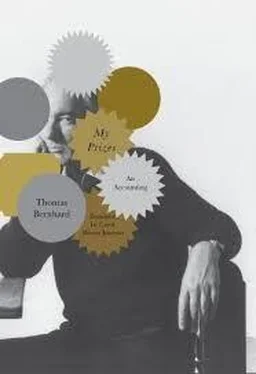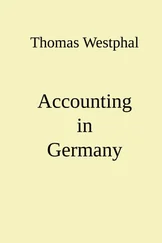The problem is always to get work done while thinking that work will never get done and nothing will ever get done … The question is: to go on, heedless of the consequences, to go on, or to stop, to call it a day … it is the question of doubt, of mistrust and impatience.
I thank the Academy, and I thank you for your attention.
The election of Scheel, the former President of the Federal Republic, as an honorary member of the Academy for Language and Poetry, was for me the final and definitive reason to separate myself from this Academy for Language and Poetry, which in my view has nothing whatever to do with either language or poetry and the justification for whose existence must self-evidently be denied by every thinking person with a good conscience. For years I have wondered about the point of this so-called Darmstadt Academy and I have always had to tell myself that the only point consists in an association which in final analysis was founded merely for the self-image of its preening members, comes together twice a year to indulge in self-adulation, and there, after traveling in luxury at the expense of the state, eats splendid high-class dinners and drinks high-class wines in good Darmstadt hotels for almost a week while beating around the bush, literarily speaking. If one poet or writer is laughable and hard for human society to bear, how much more laughable and ridiculous is a whole horde of writers and poets and people who think they’re writers or poets, all in a heap! At bottom, all these previous prizewinners come together in Darmstadt at the state’s expense, after a year of impotence and mutual loathing, to spend another week in Darmstadt boring one another to death. Writers’ chitchat in the hotel lobbies of provincial Germany is the most distasteful thing imaginable. The stink is however even stinkier when it’s being subsidized by the state. The whole contemporary steaming subvention racket stinks to high heaven! Poets and writers should not be being subsidized, and certainly not by an Academy that is itself subsidized, they should be left to themselves.
The Academy for Language and Poetry (the most absurd title in the world!) gives out an annual Yearbook , and maybe this has a point? But every Yearbook prints so-called essays which are dust covered before they’re even typeset and have nothing to do with either language or poetry, or anything to do with the creative, because they come from the clogged typewriters of thick-witted gasbags, or as we’d say in Austria, heedless busybodies. And what else is in the Academy Yearbook , aside from these stale effusions? A long list of all the possible and impossible obscure honors that these intellectual earthworms have received in the preceding year. Whom does this interest, aside from the earthworms themselves? Plus also, not to be forgotten, a hypocritical “list of the deceased,” with embarrassing obituaries playing a sort of Academy poker game of the dead, each one raising the stakes of cringe-making stupidity against the others. A shame that this Yearbook is printed on such expensive paper that it’s no good for heating my stove in Ohlsdorf. Every time the mailman leaves this load with me, I have the greatest difficulty with it.
But, people will say, the Academy for Language and Poetry (the Büchner Prize should be awarded to its inventors for this term alone!) gives out the Büchner Prize, the so-called most-admired literary award in all Germany. I don’t see why this obscure Academy has to award the Büchner Prize, for nobody needs an Academy to hand out this award. Certainly not an Academy for Language and Poetry which is a conceptual and linguistic curiosity as its title indicates, nothing more. Seven years ago exactly, when I was elected to the Academy, I didn’t think about it further or take it seriously. It was only gradually that the dubiousness of this Darmstadt Academy dawned on me, and I literally took this dubious entity seriously for the first time at the moment when I read that Herr Walter Scheel had been elected to this Academy, and I promptly resigned. If Herr Scheel is entering, I thought, I can exit at the same time.
I wish the Academy for Language and Poetry, which I consider the most dispensable institution in Germany and indeed the entire rest of the world, and which most certainly is more noxious than useful to those poets who are real poets and those writers who are real writers, the very best with Herr Scheel. Whenever one of its members dies, the Darmstadt Academy (for Language and Poetry!) always automatically sends out a black-bordered death-announcement card with an identically worded obituary text (whose language and poetry could furnish cause for argument). Maybe I’ll live to experience the day when they send out a card memorializing not the death of some honorable member, but their own.
Thomas Bernhard was born in Holland in 1931 and grew up in Austria. He studied music at the Universität Mozarteum in Salzburg. In 1957 he began a second career as a playwright, poet, and novelist. The winner of the three most distinguished and coveted literary prizes awarded in Germany, he has become one of the most widely translated and admired writers of his generation. His novels published in English include The Loser, The Lime Works, Correction, Concrete, Woodcutters, Gargoyles, Wittgenstein’s Nephew , and Frost; a number of his plays have been produced off-Broadway, at the Guthrie Theater in Minneapolis, and at theaters in London and throughout Europe. The five segments of his memoir were published in one volume, Gathering Evidence , in 1985. Thomas Bernhard died in 1989.
Carol Brown Janeway’s translations include Bernhard Schlink’s The Reader , Jan Philipp Reemtsma’s In the Cellar , Hans-Ulrich Treichel’s Lost , Zvi Kolitz’s Yosl Rakover Talks to God , Benjamin Lebert’s Crazy , Sándor Márai’s Embers , Yasmina Reza’s Desolation , Margriet de Moor’s The Storm , and Daniel Kehlmann’s Measuring the World and Fame .
Anton Wildgans (1881–1932), poet and playwright, author of dramas of earnest social criticism, became the director of the Burgtheater in 1930. A vocal defender of Austria’s independence against the National Socialists’ plan to annex Austria to Germany.
Famous Austrian prison.












